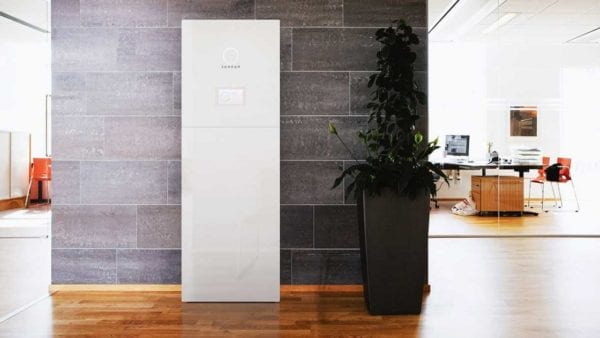German battery storage manufacturer Sonnen is about to announce the first its Australian “SonnenCity” project, a new housing estate built with solar and storage that acts as a sort of micro-grid, or virtual power plant.
Sonnen has already made a splash in the Australia battery storage market with its “SonnenFlat” product, which after the installation of solar and storage requires only a fixed monthly “software” fee to the household (usually around $30-$40).
That concept has already taken off. Sonnen has installed 1,200 of its battery storage units already, expects to reach 2,000 sales by the end of the year, and plans to triple that in 2018.
SonnenCity works on the same principle as SonnenFlat, but in this case solar and storage is installed at the time of construction, the resources are pooled together in the housing development and the households are charged only a monthly “software fee” for their electricity use.
CEO Philip Schroeder, in Australia for a visit, says the concept is perfect for new housing estates and retirement villages. The cost of solar and storage is built into the original mortgage or cost of the home, just like an oven.
The first micro-grid could be announced this week in a new housing development in NSW. Sonnen has already teamed up with building products supplier Bristile, both for a solar roof tile, and to get an inside running with project developers.
The move in Australia comes less than a fortnight after Sonnen announced a similar project in Prescott ,Arizona, where it is teaming up US house builder Mandalay Homes to install solar and storage in 3,000 new homes, creating a virtual power plant with 8MWh of storage.
Schroeder says the concept means that a SonnenCity community would need to draw less power from the grid, could maintain power in the case of a wider blackout, and could provide essential grid services where the need arises.
“Micro-grids are the only way to find smart solutions to build communities,” Schroeder says. It reduces the dependence on the grid, minimises the amount of infrastructure needed, and will deliver a significant cost saving for households.
“The problem you have in Australia (with high grid prices) can only be solved by distributed supply and distributed storage,” Schroeder says.
By having customers investing in the solar and storage means savings for all and minimal or no subsidies. As the investment is depreciated, then the electricity becomes available at zero cost.
Indeed, most serious analysis suggests that within a few decades half of all electricity demand will be sourced from “distributed generation”, which means solar and storage in individual homes, businesses and in micro-grids of the type envisioned by Sonnen.
This is seen as the only likely circuit breaker to the endless circles of sunk costs into the grid, and the rorting of wholesale markets and high retail margins which have pushed Australian grid prices to the highest in the world.
“We are optimistic about electricity prices in the long term,” Schroeder says. “They can be reduced.”
And he said that while the energy world used to deal with volatile consumption and stable production, it was now evolving to a more affordable and cleaner electricity source that happens to come with volatile production.
“There is no dispute that renewables are more economic. What we need to do is settle that volatile production, and find a way to manage the loads. That something is called the internet, and that helps make the loads able to follow the production.
“Many thought renewables as non reliable. But it is very reliable. We need to change that mind-set, and we expect to see in 10 years an incredible decrease in electricity prices because the depreciated (solar and storage) assets will produce electricity at a very, very low cost.”
Because of the success of its sales so far, Schroeder said Sonnen is still looking to establish a manufacturing facility in Australia, which makes sense given that the cells produced in Japan are shipped to Germany for integration into the storage units and then back to Australia as a competed unit.
Schroeder says “offers” to set up a manufacturing plant had been received, and the company will likely make a decision in 2018, depending on the course of sales, and once it has satisfied itself that the market will continue to be strong.
He expects the first micro-grid to be finished by the end of 2018, and pointed to a “huge” pipeline of opportunities beyond that, because most housing developers were now interested in the concept.
Individual home builders were also taking up battery storage at a rapid pace, and Schroeder says one third of the “premium” new home market will likely have storage installed over the next year.
“It used to be exotic, and not proven, but now battery storage will come with many new homes,” he says.
However, Schroeder says he is not convinced about the value of “centralised” battery storage installations like that of the “big battery” being built by Tesla in South Australia.
“Within a compound it might make sense to have four or five houses connect to one battery installation. But it is not really feasible to have large centralised batteries …. they will become the new coal power plants, you’re just replacing one old problem with a new one.”









